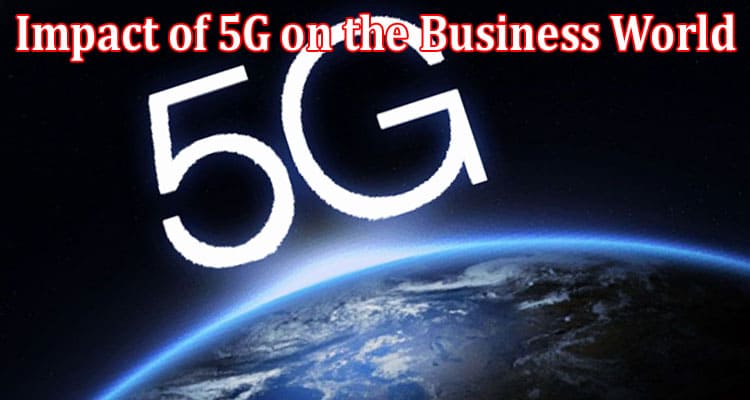The Impact of 5G on the Business World
The internet has gone from an experimental piece of technology to one of the most dominant innovations by humans. It sits at the table with the wheel, fire, electricity, and other evolutionary inventions.
As is the case with any form of innovation, it has also gone through a cycle of evolution and is currently in its best form. This form is known as 5G or the 5th generation of wireless internet. Unsurprisingly, it is one of the most commonly talked about topics in recent times. This is thanks to its profound capabilities and how it has been able to make a massive impact in the short time it has been around.
Based on its current trajectory, 5G stands to have a significant impact on a variety of different industries. 5G operates with higher frequency waves that have a short wavelength. This allows the technology to handle many devices together, including phones, sensors, and different internet of things (IoT) devices. These are being used everywhere from our homes to businesses to factories and a variety of other areas. For the context of this article, we will focus on how it is being used in business.
5G and Its Impact on Business
5G has already shown what it can do. However, it is important to know exactly what sets it apart from older technology. Let us expound on the different ways 5G offers value to businesses.
Improved Connectivity
Naturally, one of the most important aspects of 5G is the profound internet connectivity it offers. As it is a new generation of wireless technology, there are obvious benefits that come with it. For starters, it allows more devices to connect to the network.
You can have more devices online when using 5G. Most 5G networks can offer internet speeds up to 20 Gbps, an almost dizzying number. This is 20x to 100x the regular internet speeds that the world is already used to. These sorts of speeds can supercharge different areas such as the internet of things (IoT) an extended reality.
5G also offers lower latency as opposed to 4G. Where a 4G connection has a latency of 20 milliseconds, a 5G connection has a latency of around 1 millisecond. As a result, you get much faster response times combined with significantly better real-world performance. This can directly translate to better usage for bandwidth-heavy tasks such as content creation, streaming, and gaming among other things. One benefit of 5G that has recently picked up speed is the potential for remote work.
Using 5G for remote work offers the following benefits:
- High-speed internet speeds for better uploads and downloads
- Enhanced reliability that reduces connectivity issues
- Widespread coverage for more ease of working from anywhere
Better Mobile Experience
The world around us is moving a lot faster than it used to. Turnaround times for task such as correspondence and data sharing is now in seconds. When we send a message, we expect to get a response instantly if not in a few minutes at max. Cloud storage has made us accustomed to instantly having access to information when we need it. Using 5G, these expectations are met thanks to instantaneous speeds. With 5G, consumers gain access to better upload and download speeds that allow for work to be done quicker and smarter.
It allows for content to be streamed more effectively with almost no lag meaning you get seamless streaming in high quality. For an organization that uses Zoom for correspondence with each other, using 5G is perfectly ideal. The meeting can go as planned instead of people asking each other.
With such benefits, an organization can get more work done – in the offer or remotely. These sorts of benefits allow for different areas of the business to flourish notably integrating the internet of things that paves the way for real-time data transfer and much more.
5G also actively works to make for better customer engagement for a business. It does this by offering faster response times for correspondence, data transfer, and problem resolution. Since 5G has the ability to work effortlessly in areas with heightened network congestion, this allows for more to be done, regardless of where you are. Using 5G, data analytics become easier to monitor thanks to the ability to get real-time data and insights.
Automation
The term automation is defined as the use or inclusion of any product or software that takes a regular task and begins doing it automatically. In the world of business, this is something as simple as an e-commerce store plug-in that automatically sends out emails or something as grand as a smart factory that is essentially operating on its own. Among the many benefits of automation, the main ones include heightened efficiency, productivity, consistency, improved worker safety, a reduction in operating costs, and the chance to become more competitive among others.
Owing to the low latency and high-speed nature of 5G internet, we can expect 5G to conveniently facilitate automation across the world of business. A few common examples of this include:
- Widespread industrial automation using sensors, robots, and different control systems.
- Smart factories where different machines and programs are continuously in sync with each other. This increases efficiency while simultaneously bringing down any downtime that may exist.
- A business can also enable remote monitoring of different processes. This ranges from employee attendance to industrial systems. This functionality makes it easier to generate real-time data that lead to real-time decision making which results in a more streamlined set of processes. Having data transmitted almost instantly allows a business to optimize where needed.
5G and automation also house the potential for creating several avenues to make businesses smarter and more productive. There are several different areas where 5G can create new opportunities to leverage. These include:
- The internet of things (IoT). At this point, this may sound like a broken drum but the potential of 5G and the IoT is seemingly limitless. Thanks to a high-speed, high-capacity, and low latency nature, it is ideal to have a large number of connected devices ‘communicating’ with each other at all times. A direct result is the integration of connected vehicles, smart factories, and wearable tech.
- Extended Reality. The term extended reality is a combination of virtual reality (VR) and augmented reality (AR). Businesses can use these two to create more immersive experiences for customers. Using AR, a clothing brand allows customers to see how a certain outfit would look on them so they a make a more informed decision about their purchase. Using VR, a travel company can show customers what a certain location could look like. This would allow them to create a more immersive experience that would sway the customer’s decision.
Conclusion
We have never seen more defining innovations come out at the same time as we do now. Artificial intelligence, IoT, cloud computing, and 5G are just a few of the many different tools being used to change the world. Among these, 5G has the pivotal role of ensuring that these different products and services remain connected to each other. It has gone from an experimental piece of technology to the new standard in internet connectivity.
In this modern day and age, using a strong and stable internet connection is imperative. Without it, remaining competitive is incredibly difficult for a business. Opting for a reliable ISP that delivers all of this is crucial.
For high-speed internet, Spectrum is one ISP that has made a name for itself. To learn more, you can click here to take a look at their offerings and get in touch with their customer service! Another great option is Xfinity which is one of the most common names in this space. It has a reputable array of options to go around that is backed by competitive pricing and world-class service. To join the family and enjoy reliable internet connectivity, visit here for more information!




